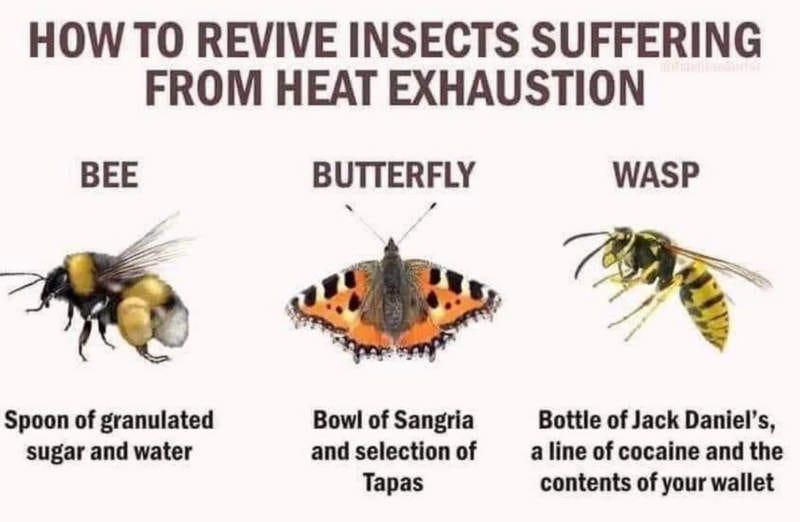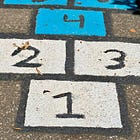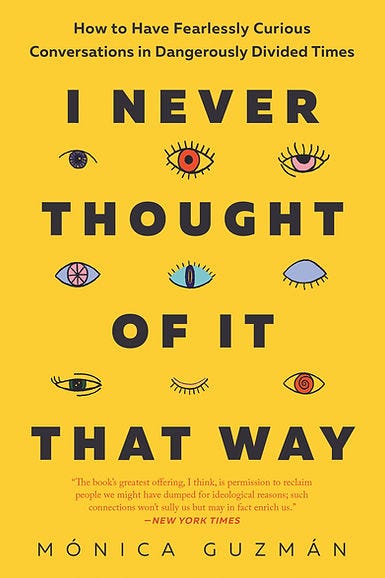"I Never Thought Of It That Way": Let's Have A Great Conversation About Difficult Conversations
"Whoever is under-represented in your life will be over-represented in your imagination."
Hello! This is Everything Is Amazing, a newsletter about science and applied curiosity.
I was initially reluctant to use the word “amazing” in the title of my newsletter - I’m British, and as shows like Downton Abbey and The Crown clearly demonstrate, we don’t go in for those kinds of wretched, unseemly displays of emotion. (A friend even suggested the title could be Everything Is Awesome! We haven’t spoken since.)
But here’s a warning for any sensitive British readers: today, I’m about to use the word “amazing” a number of times in a row. Not in that modern overused sense that gets applied to everything willy-nilly (“wow, this objectively underwhelming chicken tikka wrap is amazing!!!!!!”) but in the dictionary-correct sense, where something is worthy of a bit of genuine celebration.
Firstly, two amazing pieces of news from the cutting edge of science.
In a world first, French and Canadian researchers have found that defective mitochondria can directly drive memory loss in dementia - and by employing a new tool to boost mitochondrial activity in mice, they’ve reversed memory loss in them, paving the way for slowing or even preventing diseases like Alzheimer’s.
(Memory restoration has mostly been confined to sci-fi until now - for example, it’s a key plot point in the back end of Kim Stanley Robinson’s Mars trilogy, as I wrote about here - but it looks like it’s now getting a lot closer, maybe even right on time to help combat the plague of false memories unleashed by hyper-partisan fake news on social media.)
In other news: it seems science has perfected bee cuisine!
We know that bees are incredibly important to our ecosystems and ultimately to our own health due to their role as pollinators - which has made their declining numbers (in some parts of the world) a very worrying trend. Bees need all the help they can get - and along with banning bee-ravaging pesticides, we’ve also now learned how to feed bees better:
“Scientists have developed a breakthrough food supplement that could help save honeybees from devastating declines. By engineering yeast to produce six essential sterols found in pollen, researchers provided bees with a nutritionally complete diet that boosted reproduction up to 15-fold. Unlike commercial substitutes that lack key nutrients, this supplement mimics natural pollen’s sterol profile, giving bees the equivalent of a balanced diet.”
Amazing!
(I found both of these stories on Bluesky via - appropriately enough - science fiction writers: Hugo Award winner Ada Palmer, former president of the Science Fiction and Fantasy Writers of America John Scalzi, and Hugo & Locus Award winner Kameron Hurley.)
Secondly, I regret to inform you that despite what your eyes are yelling at you, these lines are parallel:
It's a riff - by artist Victoria Skye- on the classic Café Wall Illusion, first described in 1894 by the splendidly-named Hugo Münsterberg - he called it the "kindergarten illusion", but it was renamed in 1973 based on a café in Bristol. (Hat-tip to Nichol.s.67 on Threads.)
Amazing visual trick!
But no illusion will ever blow my mind like this one:
If you missed it, the full backstory to the Ames Window illusion is here:
Finally, and returning to bees, here is a very important insect conservation PSA:
(Thanks to gardener Lou J Nicholls for this one, and to
for resharing it.)Okay! Today, we’re returning to the alarmingly timely ongoing theme of finding new ways to disagree better:
Certainly not with random strangers yelling at you on the internet…
…but with people you already know, people you could otherwise sit down and have a very pleasant and open chat with about just about anything, before *waves hand vaguely* all this happened (extremist politics, conspiracy theories, the strip-mining of science funding in the US, you name it). All the stuff that has recently been ripping families, friendships and communities apart at a truly breath-taking pace.
For the last few months I’ve been reading and making notes from Mónica Guzmán’s I Never Thought Of It That Way (2022).
Here’s how I introduced her work to you back in 2022 - which lands a bit differently in the wake of the 2024 United States presidential election and everything happening there & elsewhere right now:
“In her terrific TEDx talk from earlier this year, journalist Mónica Guzmán outlines how empathic curiosity can be used to create understanding across seemingly unbridgeable divides.
In politics right now on both sides of the Atlantic (and elsewhere!), it seems to me that most talk of treating the opposing side with curiosity is quick to devolve into “yeah, but LOOK AT WHAT THEY VOTED FOR!!!” - followed by a finger pointed at one of the noisiest and most objectionable members of said group, with the assumption that their extremism typifies everyone who voted the same way.
Sometimes this is warranted. Awful people are undeniably awful and, in the right circumstances, well worth calling out in the interests of factchecking, debate and questioning whatever damn-fool thing they just said.
But much more of the time, this can’t be true. It just can’t. No political party in history - apart from maybe a very, very small one - has featured members who are all perfectly united in their beliefs and motivations. This is the whole point of a democracy! Everyone needs a say because everyone’s say is a little different.
How does the internet facilitate this? In places, profoundly not well. Our abbreviated tools of communication aren’t up to the job. Many of them run (intentionally or not) on superficiality, negativity and conflict. No wonder we’re all yelling.
It’s easy to say all this in the abstract. But Guzmán went and put it to the test. In researching her book “I Never Thought Of It That Way,” she put herself in the middle of those hard, necessary, boots-on-the-ground conversations, and engineered opportunities for US voters on both sides of the partisan divide to meet and share their concerns.
She gets talking to a Democrat voter called Laura:
“Curiosity’s pull is strong. Can you resist it? Laura couldn't. And that's how she found herself signing up for a trip I helped organise: a trip from Seattle to a place called Sherman County, Oregon. A place where just 1,700 people live, on land that's 10 times the size of Seattle, where “BLM” doesn't typically mean “Black Lives Matter,” but “Bureau of Land Management.”
This is a place that's the political mirror opposite of King County [Laura’s home] where Seattle sits. 74% of voters in King County went for Clinton in 2016 - while 74% of voters in Sherman county went for Trump.
We organised this trip in partnership with locals in Sherman County to let urban liberals and rural conservatives get curious about each other with each other. How does getting curious across these big divides start?
It starts by turning an assumption into a question.
On the bus ride down, Laura asked herself, “if people are voting opposite me, are they feeling opposite me on these issues that matter to me? Or is there something I'm missing?”
During the event, a Sherman county farmer named Darren stood up near Laura - all six foot nine of him - and pointed to the plates of leftover sandwich we'd had for lunch. Darren grossed 7000 acres of wheat with his Dad and son. He looked at the people from the big city. “If you knew,” he said, “what it took to get that sandwich on your plate...”
Turns out, Laura and Darren had some things in common. Darren has no issue with same sex marriage or other civil rights. He wants a healthy environment. His crops depend on it. So why did Darren vote for Trump?
The Waters of the United States Rule figured into it, he told us - it was threatening his business. Now, when he said this, the locals from Sherman County all kind of nodded their heads. But Laura and everyone from Seattle, we just looked at each other: the Waters of the United States? What the heck is that? Turns out, the Rule defines what bodies of water fall under federal regulation - and farmers are worried that it could be interpreted to cover small seasonal rain-made ponds on their land.
Losing control of their land is a nightmare for any farmer. Many of them don't trust Democrats to take their concerns seriously. But they might trust Republicans - and the businessman America had just elected president.
Laura did not see this coming. She told me, “it never entered my consciousness that they voted that way for reasons I hadn't even considered, or for reasons that didn't matter to me.”
She had found some things she was missing. And that experience she told me has helped her turn her assumptions about other people into questions ever since.
“Our lives are so different,” he said. “We're not even playing the same game at the end of the day.”
But we assume we are playing the same game pretty often. Same rules, same objectives. We assume people oppose what we support because they hate what we love. That doesn't just keep us from seeing what we're missing - it keeps us from staying informed about the one thing that scares us most: each other. In one CBS YouGov poll this year, most Americans said that the biggest threat to the American way of life is “other Americans.”
Now it's true, there are people at our political extremes who are so consumed by hate that they are worth fearing. But researchers at the University of Pennsylvania looked into the hostility inside sends the other and they found something fascinating. They found that people on either side of America's political divide, assume the other side despises them twice as much as they actually do.
This fear? It's a problem. Because you can't wonder about something you think is out to get you.”
As Guzmán says later in her talk, what everyone wants in a functioning society is to be heard and to be understood. And it’s more fundamental that that - it’s a basic human need. See me for who I am.
Talking about kindness, we usually think of tangible gifts, the kind we get at Christmas or on our birthdays. Or we just boil it back to money. But taking the time to listen and understand are a great kindness too - sometimes a priceless one. They give another person the dignity of being heard, to have a voice that says exactly what they’re saying, instead of what we assume they’re saying.
All of this is fantastically hard to put into practice. Election cycles remain dominated by news media soundbites, social media yelling-matches and everything else that hasn’t worked so well in actually creating conversation. Oh and hey, an extremely opinionated billionaire recently took over Twitter. The yelling will continue.
But as Guzmán says: “whoever is under-represented in your life will be over-represented in your imagination.”
The ability to step back from an assumption about others, turn it into a question, and get curious about what you don’t know about why a stranger is voting the way they are when it’s so obviously the wrong thing to do on every level and what are they thinking and they must be monsters - that pause is worth exploring, for all our sake. To lessen our grip on our opinions, and consider what we don’t yet know we don’t know - and to give a stranger the kindness of the benefit of a doubt, until you find a way they can tell you directly what’s up.”
OK, back to today.
It’s a really fascinating book, brimming with ideas on how to steer stormy conversations into calmer waters, so you have the chance to really truly hear each other out. It’s also an intimately-focused one, which doesn’t pretend to have any big answers about the hugely pressing social and political questions of our time, but instead is concerned with those in-person conversations that hit us so much harder.
(If it has one universal takeaway, it’s “the best answers come from talking with people, not about them”.)
I’m going to be writing upcoming newsletters about what I’ve learned from reading this book and scurrying down its many fascinating rabbit-holes.
But then I realised that’s probably the least interesting and fruitful approach to take here. What would be better would be some kind of open conversation with you around this book. How could that happen?
Thankfully, I already have a format for doing that.
Last year, I ran the first edition of what I was calling the Big Amazing Read, focused on Alexandra Horowitz’s book On Looking: Eleven Walks With Expert Eyes.
It was great fun to dive into this book (one of the inspirations for Everything Is Amazing) with around a hundred of you reading along!
At the same time, my execution of it, ummm, let’s just say it could have gone a lot better - I overcomplicated things in my usual blunderingly enthusiastic way, including by using another platform (Threadable) for part of the read, and it ended up being a bit confusing for some folk - those folk including me.
This time, I’m keeping it super-simple:
To take part in this round of the Big Amazing Read, all you need is your own copy of Mónica Guzmán’s I Never Thought Of It That Way. The best place to look for links is her website’s page for the book.
At the end of September I’ll publish a free EiA newsletter about the book, to give absolutely everyone who has read the book a chance to give their thoughts on it and chuck around ideas.
Paid subscribers to Everything Is Amazing will also get additional essays, including my own detailed breakdown of the book’s takeaways and further offshoot investigations into this whole topic - all working a bit like the paywalled miniseries from previous seasons on the effect of geology on human behaviour and the new science of human memory.
In a few weeks I’ll also invite paid subscribers to sign up for a Zoom chat about the book in October, with 20 places available on a first-come, first-served basis. The recording of this chat will also be available to all paid subscribers.
If you want to take part in everything this Big Amazing Read will have to offer, I’d love to invite you in as a paid subscriber of this newsletter:
(Thank you!)
But either way, I hope you’ll give I Never Thought Of It That Way a read. I think it’s a really terrific guide to getting everyone back around the table to have all the conversations that are so desperately needed right now.
Cheers!
Mike








Hey hey, it’s your resident bee nerd buzzing in with some extra context on the honey bee food convo! 🐝
So, here's the buzz (sorry, can’t help myself): it's not the honey bees that are struggling. It's all the thousands of other kinds of bees: the wild, free-spirited ones that aren't forming an orderly factory to make honey for us humans. They're not declining because they're lazy, but because they’re being outcompeted.
With the rise of perfect supplement foods, honey bee colonies are thriving. They’re growing bigger, stronger, and faster...but because they’re thriving, they’re basically dominating the buffet, leaving wild bees with slim pickings.
So the bee food is only really great news for beekeepers though...because more honey bees = more honey =💰
I was so excited by the title of your newsletter, and when I got to the part about how you’d read this book…I was surprised to see Monica Guzman’s name, and excited.
She and I used to share a city, and she ran a newsletter for Seattle called The Evergrey which was an incredible hyper-local aggregator of content and things to do.
We often exchanged emails back and forth on wondrous events in the city, and even had the opportunity to have breakfast together and talk about life.
It has been fascinating to watch as she has taken on the giant task of helping people to have hard conversations.
…and now her book is here in your newsletter, and it’s wild how small the world really is when you’re part of the group of people trying all over the world to bring kindness, curiosity and sew the opposite of discontent.
Thank you for highlighting her work.
I’m grateful to you for your writing, enthusiasm and use of words like ‘amazing’ in a context that makes so much sense to my brain.
I hope your day is beautiful. Thank you for adding to the kindness and curiosity of the world.